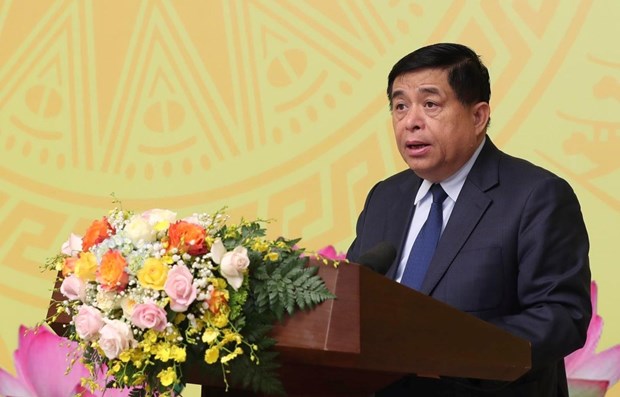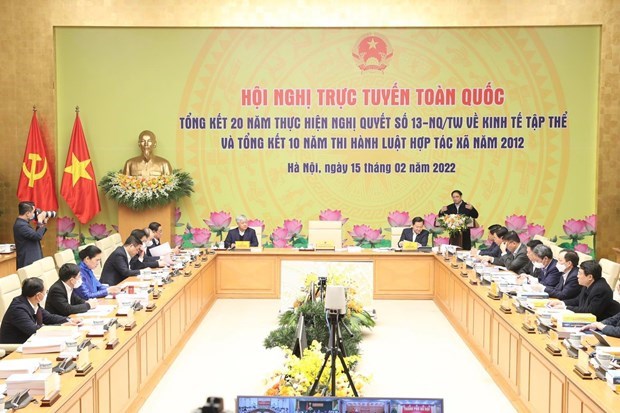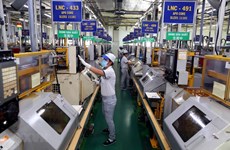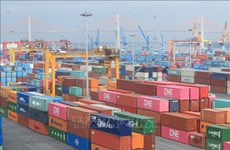Collective economy’s contribution to national economy remains modest: minister
The expansion of the collective economic sector is equivalent to just about half of the overall economic growth. This sector’s contribution to the GDP has also declined continually, from 8 percent in 2001 to 3.6 percent in 2020.
 Minister of Planning and Investment Nguyen Chi Dung addresses the national conference reviewing the 20-year implementation of Resolution No. 13/NQ-TW on the collective economy. (Photo: VietnamPlus)
Minister of Planning and Investment Nguyen Chi Dung addresses the national conference reviewing the 20-year implementation of Resolution No. 13/NQ-TW on the collective economy. (Photo: VietnamPlus)Ministry of Planning and Investment Nguyen Chi Dung made the remark while addressing a national conference on February 15 that reviewed the 20-year implementation of Resolution No. 13/NQ-TW on the collective economy, issued at the fifth plenum of the 9th-tenure Party Central Committee on March 18, 2002, and the 10-year enforcement of the Law on Cooperatives.
Potential yet to be fully tapped
Minister Dung said Resolution No. 13 had made a precise assessment of the situation and identified the focal requirements, orientations, and tasks for the collective economy development. It has been carried out seriously, resulting in certain initial outcomes.
However, he noted, the collective economic sector has yet to have its potential and advantages fully tapped and yet to become a stepping stone for the national economy.
In particular, this sector’s growth remains modest, equivalent to about half of the overall economic expansion, while its contribution to the GDP has declined continually, dropping to 3.6 percent in 2020 from 8 percent in 2001, failing to achieve the targets set in the resolution.
He blamed that fact on unsystematic research activities on cooperatives and the lack of specialised research and training institutions, adding that knowledge about the collective economy hasn’t yet been included in the curricula of universities, colleges, and vocational schools as demanded in the resolution.
The resolution requested specialised bodies on the collective economy management be established so as to monitor and guide the implementation of related policies.
But such management agencies haven’t met requirements, Dung pointed out, their staff haven’t gained a good grasp of the sector or fulfilled their role in advising the Party and State regarding the collective economy management. In addition, legal regulations and policies on cooperatives still contain many barriers to the development of cooperatives.
 The national conference reviewing the 20-year implementation of Resolution No. 13/NQ-TW on the collective economy and the 10-year enforcement of the Law on Cooperatives. (Photo: VietnamPlus)
The national conference reviewing the 20-year implementation of Resolution No. 13/NQ-TW on the collective economy and the 10-year enforcement of the Law on Cooperatives. (Photo: VietnamPlus)The official held that the collective economy, including cooperatives, must be developed in a truly dynamic, effective, and sustainable manner in the time ahead, adding the collective economy and cooperatives form an important part of the national economy.
To achieve the set targets, he said it is necessary to concurrently carry out some tasks and solutions, including raising the consensus on and awareness of the collective economy.
Developing the collective economy is an inevitable need and trend during the development of a socialist-oriented market economy. Therefore, the role of local Party committees and administrations, along with the coordination among ministries, sectors, and organisations, in this regard must be further enhanced, according to Dung.
Meanwhile, state agencies should press on with overhauling regulations, creating an optimal environment for the sector to grow, and consolidating the management apparatus, he said, recommending attention be paid to improving transparency and applying information technology to management.
Human is the decisive factor, so the management staff must have high professional capacity as well as political steadfastness so that the collective economy can develop healthily and in the right direction.
The minister urged thorough settlement of outstanding problems along with the formation of new-style collective economic models that match the Fourth Industrial Revolution and Vietnam’s international economic integration process.
The Vietnam Fatherland Front and organisations also need to have a thorough grasp of the Party’s viewpoints and guidelines, the State’s policies and laws to help boost the collective economy and effectively implement the resolution, he added./.












